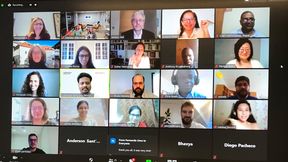Interesting methodology workshop organized by SUB researchers

The Sustainability in Business research group co-organized a virtual workshop on conducting field research in methodologically challenging settings. Other organizers of the event, which took place on Thursday and Friday 1-2 Oct, were the Centre for Social Innovation Management at University of Surrey, the Science Policy Research Unit at University of Sussex and Foundation Getulio Vargas (FGV) Sao Paulo School of Business Administration.
The workshop explored the methodological restrictions that typically ignored, trivialized, misrepresented or deemed methodologically weak by mainstream management journals. While research in challenging settings can provide crucial insights for advancing management research, there are major methodological constraints that may limit publication opportunities. These include issues associated with illiteracy rates, language and cultural barriers, unreliable statistical data, corruption, lack of freedom of speech and unsafe or remote communities. Yet, the majority of management research is conducted in environments unencumbered by such constraints, and thus of limited relevance in challenging regions. The theme of this workshop was to therefore develop rigorous methodologies in challenging settings for publication in leading journals.
Many insights were raised by the keynote speakers during the panel session (Day 1), including the importance of stakeholder engagement and the use of multi-methods, which can help addressing data collection difficulties. On Day 2, the dialogical session presented by professors Minna Halme and Rebecca Piekkari challenged current conventions of qualitative research and assumptions that reviewers of top journals typically hold in the field of management and organization studies. They concluded that while innovativeness and creativity is needed, it's not so much about new methods for challenging contexts, but rather how to apply and how to modify the current methods for contexts that are dissimilar to those were the good practices and qualitative research templates were originally developed. Finally, during the roundtable sessions, a variety of experiences on methodological difficulties, and possible solutions, were exchanged amongst paper presenters and audience.
With thanks to our leading academics and editorial members of top management journals that took part in the workshop:
- Prof. Charla Griffy-Brown (Editor-in-Chief, Technology in Society)
- Prof. Wim Vanhaverbeke (Co-Editor-in-Chief, Technovation)
- Prof. Pablo Munoz (Associate Editor, Journal of Business Venturing Insights)
- Prof. Madhu Viswanathan, College of Bus. Admin., Loyola Marymount University, Los Angeles. Professor Emeritus, Department of Bus. Admin., Gies College of Business, University of Illinois, founder of Subsistence Marketplaces Initiative and Marketplace Literacy Project.
Organizers:
- Dr. Stelvia Matos (Surrey Business School, UK)
- Dr. Marleen Wierenga (Aalto University School of Business, Finland)
- Prof. Jeremy Hall (Science Policy Research Unit, University of Sussex Business School, UK)
- Prof. Minna Halme (Aalto University School of Business, Finland)
- Prof. Susana Carla Farias Pereira (Fundação Getulio Vargas, Brazil)






